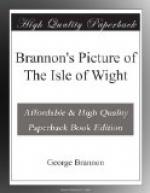* * * * *
NEWPORT is allowed by most travellers to be as clean and pretty a country-town as any in the kingdom. The houses are of a modern and respectable construction: the streets regular and well paved, with sufficient descent to be always clean; and two copious streams water it on the east and west.
Being closely surrounded by an amphitheatre of lofty downs, beautifully checquered by pasture and cultivation, cottages and villas,—the environs are of the most agreeable and inviting character, and the climate mild and salubrious; to those therefore who love to blend social intercourse with the pleasures of a cheerful yet quiet retreat, Newport presents many decided attractions. Years ago it was observed, that “there were few provincial towns which could afford independence more sources of rational enjoyment:” and since then there has been a great accession to the local means of intellectual pleasure, in respect of philosophical and literary institutions, private and professional reading societies, a Mechanics’ Institution, circulating libraries, &c. &c. The places of public worship too have equally increased; being three episcopal (two of recent erection), two for Independents, two for Wesleyan and Primitive Methodists, a Bible-Christian, a Roman-catholic, a Unitarian, and a Particular-baptist. There are five respectable inns, in the town (see the List), and two assembly-rooms.
From its central position, it is well calculated for being the principal market-town, and, as it were the metropolis, of the island. On the Saturdays in particular, it presents a very animated scene: being frequented by all classes who are obliged to attend for the purposes of business, or upon judicial affairs; which would naturally induce many other parties to visit in favorable weather, were it only for the sake of a pleasant jaunt.
These advantages of course give it a steady trade in almost every branch of business; and latterly the shops have exchanged much of their antiquated country appearance for the more imposing style of the fashionable towns,—where dazzling glare is resorted to as the chief attraction.
Though Newport does not depend, like the watering-places, upon the annual influx of visitors engaging their lodgings for a season, yet many of the best situated and most convenient houses are handsomely fitted-up for the purpose; and should the river be ever sufficiently deepened to admit a passage steamer to ply at regular hours without regard to the state of the tide, Newport might defy all competition, by the rapid improvement of its various local capabilities which would necessarily follow.
The River (called the Medina, from dividing the island in the middle,) is navigable from Newport to Cowes for vessels of sixty or seventy tons burthen, during high water. The banks are beautifully dressed with scattered groves and copse-wood: and interspersed with the arable fields and meadows are several churches, seats, villas, farms, and cottages, on either side: and as the lands rise rather boldly, the while scene is viewed to advantage from the water, and will be found to afford a very delightful trip on a summer’s day, to or from Cowes; the party leaving by the returning tide after about two hours’ stay at either place.




